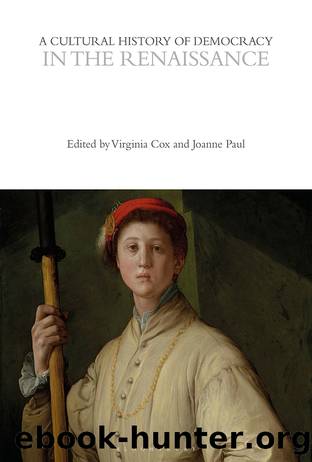A Cultural History of Democracy in the Renaissance by Virginia Cox;Joanne Paul;

Author:Virginia Cox;Joanne Paul;
Language: eng
Format: epub, pdf
Publisher: Bloomsbury UK
CHAPTER SEVEN
Human Diversity and Democracy in the Renaissance
PETER STAMATOV
For all its intellectual glories, the Renaissance lies in the extensive fallows of democratic dormancyâa stretch of time disconnected from the long-arched historical and intellectual bridge between Aristotelian antiquity and modern liberal democracy. Nevertheless, the period can usefully be seen as a democratic laboratory of sorts: a laboratory of cultural models, practices, and institutions aiming at the recognition and dignified treatment of the bearers of consolidating and proliferating identity designations that separated individuals into national, ethnic, racial, and religious categories. And, because of that, the Renaissance bestowed on modern democracy important historical legacies that configured its shape.
An important driving force of the larger democratic project in history is, as John Dunn writes, the âdetermination and longing to be treated with respect and some degree of considerationâ (2019: xxiii). This is an impulse, in other words, toward the recognition of the dignity of human beings regardless of their outward characteristics, whether these characteristics be considered innate and âbiologicalâ or imposed by convention and culture. This democratic impulse toward the recognition of human dignity is, however, in a tense dialectical relationship with human communitiesâ inherent tendency to make distinctions among and within themselvesâand to differentially allocate resources, material or symbolic, according to these distinctions. On the one hand, the egalitarian democratic impulse is at cross-purposes with the establishment and preservation of distinctions between humansâat least within the bounds of the political unitâbecause such distinctions invariably tend to cluster into cultural and political hierarchies in which different human characteristics are associated with differential levels of cultural prestige and political power. On the other handâand precisely because of such invidious distinctionsâthe democratic impulse is inevitably directed toward the redress of the injuries on subordinate identities that hierarchies inflict and thus works to symbolically recognize, valorize, and affirm the dignity of these subordinate identities. Yetâto close off the dialectical circleâin this affirmatory work distinctions, albeit different types of distinctions or distinctions of a different hue, are being maintained in tension with the primary universalizing thrust of the democratic impulse.
The democratic impulse is thus intrinsically engaged with distinctions and differences: it seeks to remove them or redefine the cultural and political value of existing categories of distinction. In both cases, however, the democratic impulse aspires to be transformative. It seeks to change, contest, and redefine. Both the distinction-destroying and the distinction-upholding forces of the democratic project relate to and target existing categories and classifications as a challenge and as a stake of symbolic struggles. These struggles can be over various aspects of social categories: who belongs and who does not belong to a class of people, how boundaries between identity categories should be drawn and redrawn, but alsoâand perhaps most fundamentallyâwhat material and symbolic resources should be granted to different categories of people.
It is in such confrontations with hierarchies of distinction that we can locate the Renaissanceâs democratic relevance. Observed from the heights of democratic triumphs in recent history, the epoch of the Renaissance could be easily dismissed
Download
A Cultural History of Democracy in the Renaissance by Virginia Cox;Joanne Paul;.pdf
This site does not store any files on its server. We only index and link to content provided by other sites. Please contact the content providers to delete copyright contents if any and email us, we'll remove relevant links or contents immediately.
Adding Value to Policy Analysis and Advice by Claudia Scott; Karen Baehler(455)
Sociological Perspectives of Health and Illness by Constantinos N. Phellas(444)
Race and American Political Development by unknow(441)
Human and Global Security : An Exploration of Terms by Peter Stoett(425)
American Government and Politics Today by Steffen W. Schmidt Mack C. Shelley Barbara A. Bardes(424)
Control Of Oil - Hardback by Kayal(407)
Entrepreneurship Education and Training: The Issue of Effectiveness by Colette Henry Frances Hill Claire Leitch(364)
The Catholic Church and European State Formation, AD 1000-1500 by Jørgen Møller(355)
Materializing the Middle Passage by Jane Webster;(349)
The World According to China by Elizabeth C. Economy(343)
Left Is Not Woke by Susan Neiman(328)
Turkey's Relations with the West and the Turkic Republics: The Rise and Fall of the Turkish Model by Idris Bal(313)
Theories of Counseling and Psychotherapy: A Case Approach by Nancy L. Murdock(313)
Cross-Cultural Child Development for Social Workers by Lena Robinson(306)
Japan's Ainu Minority in Tokyo by Mark K. Watson(297)
Advances in Child Development and Behavior, Volume 37 by Patricia J. Bauer(295)
Laboratory Life by Bruno Latour(294)
Beyond Service: State Workers, Public Policy, and the Prospects for Democratic Administration by Greg McElligott(284)
The Oxford Handbook of Museum Archaeology by Stevenson Alice;(275)
